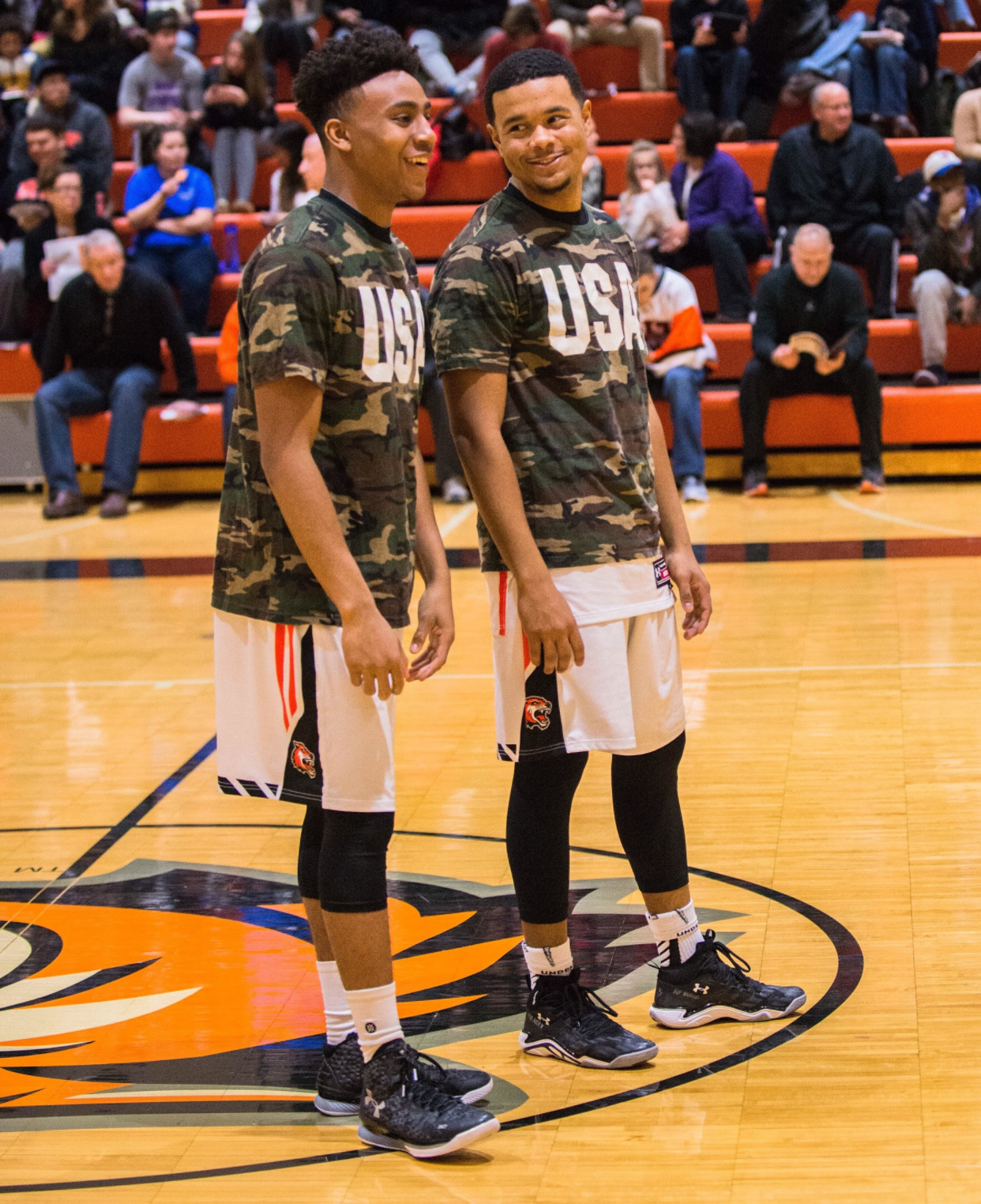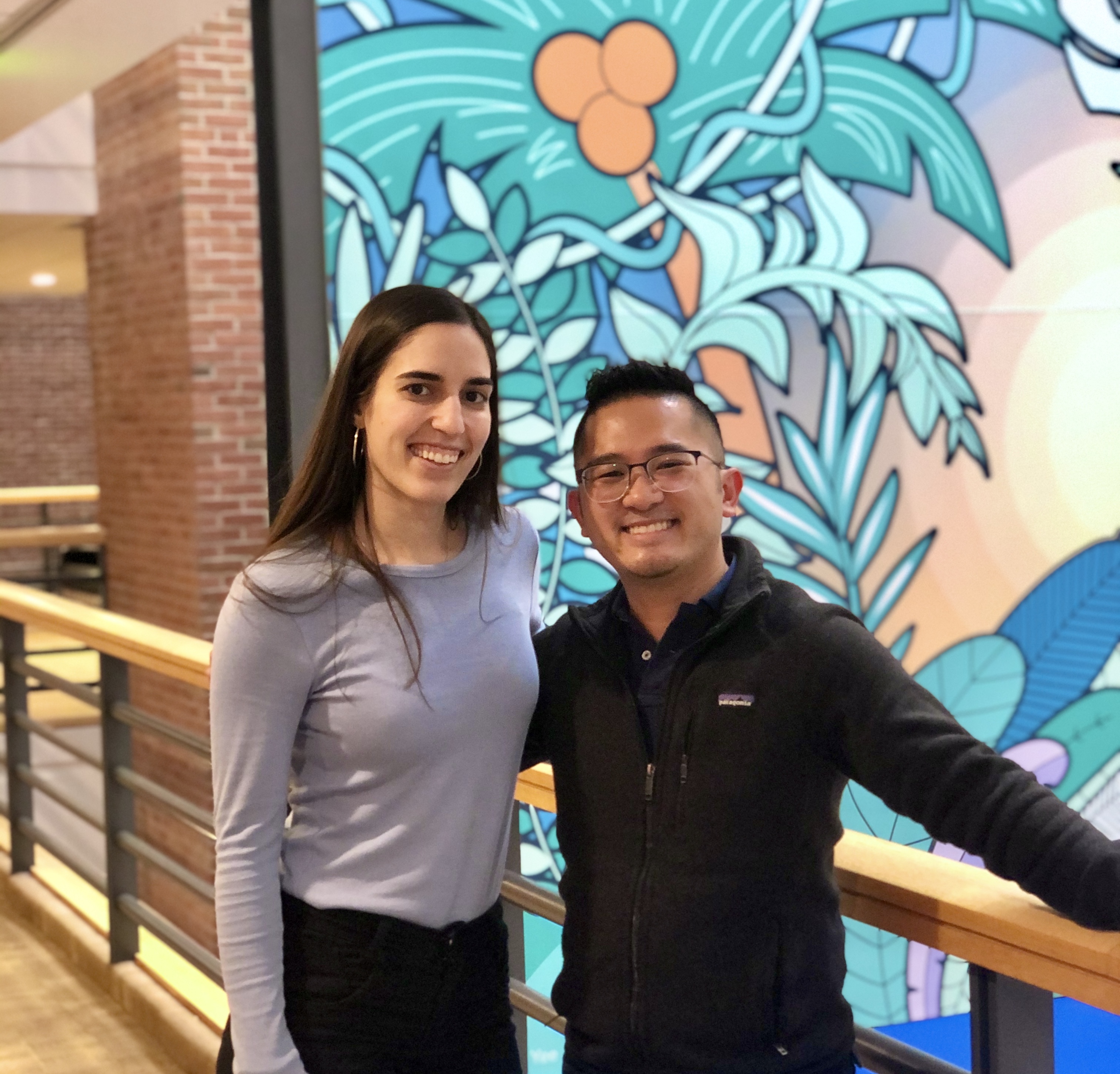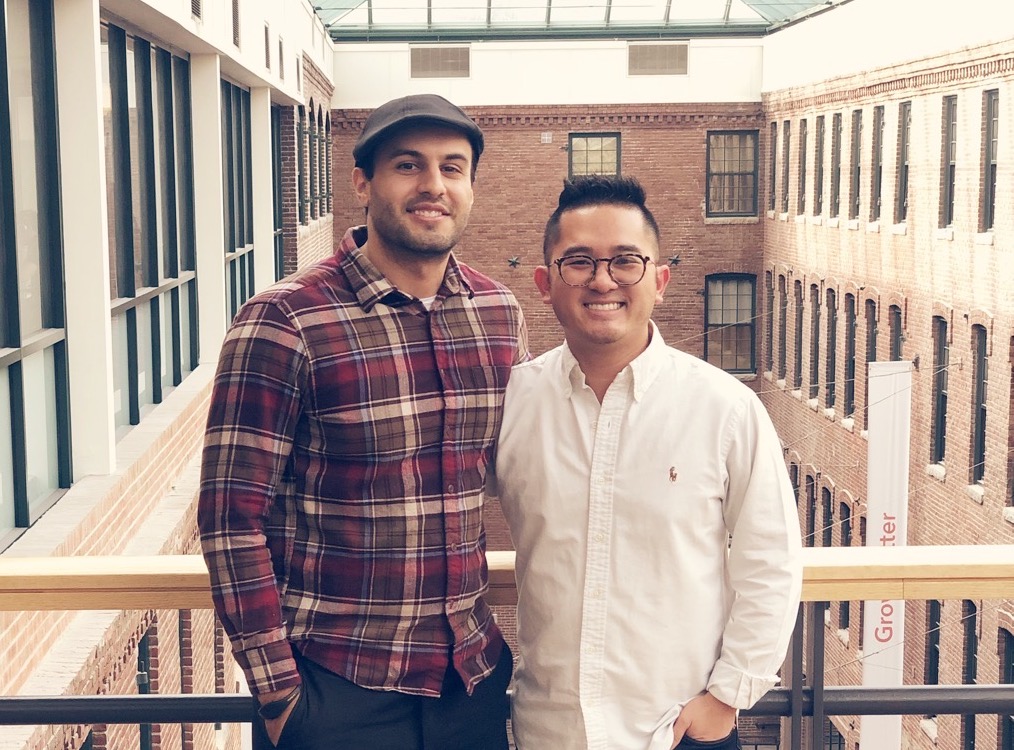About the Series
In our Campus to Career series, I sit down and chat with remarkable people about how they started and grew their career.
.png?width=1280&name=Careers%20Blog%20-%20Campus%20to%20Career%20logo%20(1).png)
What was going through the mind of their college self? What prepared them for a job? What worked (or didn’t work) for them in their career search? What would they have done differently? What is their career today and what do they love about it?
Every episode is an opportunity to uncover these questions and more, and our goal is to provide some advice and inspiration to spark your career path.
Transcript
VC: We've worked together for a long time on how to help students and people in their career search through a lot of different events. That's how you and I first met. And so when you asked to come onto the show, I was like 100%.
Let's share your story and expand a little bit more since at other the events we had, we only had like maybe 20 minutes to talk, but now we get to spend a lot of time on you and I know background wise, I'm just going to - for everyone who's just meeting Troy - some quick background on Troy.
You graduated from the Rochester Institute of Technology in Rochester, New York in the spring of 2018. And then joined HubSpot three months later in August of 2018 and you're currently a customer success manager on our team.
Since joining though, you've had a lot of great career mobility too and a bunch of different roles since you started, which is awesome. And congrats by the way. And we're going to definitely start there and unpack and then learn what Troy is today and then work our way backwards a little bit because your story again is something that I wanted to make sure that we give justice to and share a lot about.
Let's start with who you are today in terms of a CSM - what is a CSM, or a customer success manager, if we didn't know what that was?
TPL: Definitely, yeah. First off, thank you for having me. I'm happy to be here and share my story.
But yeah, I'm a customer success manager at HubSpot, so in short or in English, rather, I help our customers with their Inbound strategy. I help them align the product that they're paying for with their services or their platform, their product, whatever it is that their company does and ensure that they're seeing value in what they're paying for. Help them tweak their marketing efforts and sales efforts and just run the full top to bottom account management for our small to medium businesses.
VC: Nice. And this is a role you stepped into actually really recently, right?
TPL: I came over in December of last year at the very end of December. I was previously in a very similar position just working with a different bucket of customers. I was an agency account specialist, so what I did was, I worked with our accounts that were purchased through an agency or third-party seller.
Now I work with our accounts that purchase from our sales team, so just a different bucket of customers but essentially still doing the same thing. And I did that for about six, seven months.
VC: Was that your first role at HubSpot being on our agency team or did you have a different role before that too?
TPL: I actually had a role before that as well.
I came in as a technical support rep, did that for just about a year before I made the transition to ACP, which is the agency client program, and then ultimately made the next step to being a CSM. So quite a bit of mobility in just under about a year and a half. It's been fun though. It's definitely been fun.
VC: Which is crazy! It's so crazy that you've had that much change in less than two years. And I mean that's definitely normal for us [at HubSpot], but I think three roles is unique and a lot of it is, well, a lot of it was driven by you and then a lot of it is driven by our organization too, it seems like.
So I was wondering like could you walk us through how you went from agency to CSM so quickly? Because I think there was a story there in terms of how that evolved into where you are now.
TPL: Yeah, I definitely want to highlight that a lot of it is the opportunity being there. So I'm grateful to HubSpot for allowing us to move up into the right as quickly as possible when the time is right.
But what happened with the agency client program is we were as a team analyzing the internal process and just putting ourselves in the shoes of our customers. And that [process] was more of a short term consulting framework so they would work with us for 60 to 90 days and then be passed along to a long-term customer success manager.
Just from analyzing the internal process, how many hands are in the pot, how many times people were being reassigned to accounts - we just came to the conclusion that this wasn't the best experience for our customers.
And ultimately, we created a framework that allows our customers to get the same level of consulting with the same person regardless of who they purchased through.
We thought it wasn't fair to our customers to get a one-time consultant versus the ones who are buying from an agency who are getting a short-term consultant and then a long one. It doesn't really matter where you purchase, you're a HubSpot customer, so we thought that making that change would be best for our customers. And they've had nothing but good things to say about it.
It was fun being a part of that process and it's great working at a company that allows their employees to look at processes and implement changes that are necessary.
I can't take full credit for that. That was something that was going on far before I joined that team, but it was really fun being a part of it, helping everyone adjust and get up and running and bringing my knowledge from my old team to my new team and vice versa. It was definitely a fun time. We're still working through it, still transitioning. But it's been a blast for sure.
VC: I think that's been a highlight for me at HubSpot is just how adaptable to change we are, especially when it's to the benefit of our customers. And also HubSpotters, but more so customers. And you've definitely seen that from your experience.
Just thinking back from when you first started, was this something that you thought was going to happen? Did you expect something like this to happen in terms of how your mobility has gone?
TPL: In full transparency, I don't think I anticipated three promotions in a year and a half. It just, to be quite Frank, that seems like unattainable. You know, you hear a lot about how startup companies have room for growth or rapid expansion and it sounds good, but a lot of times it's not what it is.
I did expect a little bit of change and shifts in the company and structure coming in, I knew that, but I definitely didn't anticipate this, but not in a bad way at all. It's fun. I think it's great to be able to flex your brain in different directions, continue to learn different ways and service our customers in different ways.
VC: If I remember correctly, HubSpot is your first company after college, right?
TPL: Yeah, definitely. HubSpot was my first company after graduation. Almost two years later. Couldn't be any more happy with my decision.
-2.jpg?width=1242&name=Image%20from%20iOS%20(7)-2.jpg) VC: That's awesome. And if I was playing a game of Connect the Dots from college to today, I know that your college experience really played a hefty role in how you made not only your choice to come to HubSpot as your first place to come after graduation, but it also just answered for a lot of things that you were really missing because of the things you had in college. I'd love to unpack that a little bit.
VC: That's awesome. And if I was playing a game of Connect the Dots from college to today, I know that your college experience really played a hefty role in how you made not only your choice to come to HubSpot as your first place to come after graduation, but it also just answered for a lot of things that you were really missing because of the things you had in college. I'd love to unpack that a little bit.
One is definitely that you were a business major at RIT? Because whenever I think about RIT, I always think about computer science or engineering, but that wasn't your experience, right?
TPL: Yeah, definitely. You hit the nail on the head. I went in as an engineer so I spent my first year in mechanical engineering and just reflected on that year and came to the conclusion that it wasn't for me. It just wasn't what fit my personality best or match my interests, and I made the decision to move into the business school.
I've always been like a math and numbers guy, and I knew down the line I wanted to do relationship work, whether that'd be account management or anything like that. So I ultimately decided to major in both finance and management, minor in communications as well. Definitely a drastic switch from engineering to business, but ultimately, I thought it was just the best decision, and I thought it gave me the best opportunity to succeed with my personality, my work ethic and the structure of how I prefer to work.
VC: Now that I know you're a CSM and having had that experience, I can see the dots connecting there, which is actually really cool to see. And again, you've been able to achieve that in just less than two years, which is awesome.
But I also know too that you also went into RIT as an athlete too. So can you walk us through like what that experience looks like for you and, and I actually think that was probably the bulk of your experience at RIT, if I'm not mistaken.
TPL: Yeah, definitely. And I think for any student athlete, it’s the bulk of their experience. But I went to the Berkshire School in Western [Massachusetts] and then ultimately decided to go to RIT to play basketball and to be a student as well. But I think basketball definitely drove that decision. I really believed in the school team, the culture and the coach.
-7.jpg?width=1000&name=Image%20from%20iOS%20(1)-7.jpg) But yeah, being a student athlete in college is, it's tough, but it's very fun. I think it consumes a lot of your time. It leaves little mental capacity to invest in other things. So it can definitely shape what plays out after college so it was fun. Definitely demanding and I spent a lot of time doing that. But I think it was a huge part of my experience and it helped me grow into who I am today and I've picked up a lot of things along the way through the sport that I use in my everyday life.
But yeah, being a student athlete in college is, it's tough, but it's very fun. I think it consumes a lot of your time. It leaves little mental capacity to invest in other things. So it can definitely shape what plays out after college so it was fun. Definitely demanding and I spent a lot of time doing that. But I think it was a huge part of my experience and it helped me grow into who I am today and I've picked up a lot of things along the way through the sport that I use in my everyday life.
VC: Why was basketball your thing that you gravitate towards?
TPL: I think any college athlete will answer this question the same.
It's not necessarily the basketball or the soccer ball or tennis racket, it's what happens in that environment. I can't remember the last friend that I made that wasn't some way tied to basketball. It was why I went to boarding school. It was why I made the friends I made. And it just creates this really unique culture that not everyone gets to be a part of. I really do wish everyone could experience that.
So that's for me why it was so important. I have lifelong relationships with people that I only spent four years with. And that's invaluable to me to be able to lean on people, to be able to depend on people, to be able to expect unbiased feedback from your circle.
Things of that nature just make me so high on sports because I know what it does for a person. And it really helped me grow and helped me hold myself accountable to understand the big picture. Team before me. And it was just an invaluable experience.
VC: And so let's talk about that too. From being a college athlete, you learn not only how to be a great expert of your craft of course, but also you learn a lot of tangible things for your future. You probably don't know it at the time, so what were some of those things that you felt like you learned a lot from being an athlete?
TPL: I think what you said is spot on. You don't realize that you're learning these things or building these characteristics or becoming a better person until you step away from it and look back.

That can be unfortunate because sometimes you're like, “this is taking up all my time,” but it's truly molding you into a better person. Looking back on it and just going through the nature of my day to day and understanding the challenges that I face, I definitely have to chalk up some points to basketball.
It helped me deal with adversity. I always speak about that.
The ability to communicate with different people in different ways. I was fortunate enough to serve as a captain for three years. And one thing that I struggled with early on was understanding who I should speak with in a certain manner. You can't address everyone in the same way. So throughout those three years, I really learned how to communicate with different people and really understand their preferred way of communication in a short window.
There's very little room for error in relationships, especially when there's a lot at stake. And I use that now with my accounts. I have to understand their preferred way of communication, how they like to go about their day to day.
I think through basketball, you’re really able to learn that because of how diverse the sport is, it brings people together from all different communities so you really understand people or you're forced to understand people and it helps you become a chameleon.
And what I mean by that is, I feel confident being dropped in any environment and blending in and being able to have a solid conversation with whomever is sitting across from you at the table. And that's something I've definitely learned through basketball.
And then also just accountability is a huge thing. You have to choose to do the right thing, choose to do it with passion from beginning to end without straying left and right. And I bring that into my work as well. I hold myself accountable when I promise my customers stuff. I'd put my full effort forward when I'm working with someone. I assume their responsibilities as if they're my own.
And so I think I would highlight those three as the most of the things that I picked up along the way.
VC: That's awesome. I wasn't an athlete in college or high school of any sort. I am not a sports ball person and I am proud of that, but at the same time I wish I was because I think I would have probably had better coordination, but that's just me.
But something I'm definitely learning about from a lot of friends and coworkers who've been athletes before is just how much effort and work ethic you have and also the grit that you've developed because sports takes up a lot of your time.
And to balance out with school, I am just starting to really see how much of a toll it can take and how much of a balance that is. It’s a lot so I really admire college athletes who can go through that regimen of going to practice or going to games, doing a lot of that outside work to help your team, and then balancing schoolwork on top of that. That's so much for someone so young to have to navigate. And I admire them so much just looking back now on how people manage that experience.
When you think about having had that experience for so long at RIT, graduating and then shifting to your first job and starting a career, what was that like? Did you want to continue doing sports after college, or doing some of that was still in that area? What was that kind of transition like for you?
TPL: To be quite honest, it's tough. I think every one who plays their sport at a high level wants to play as long as possible. And even those who say they don't, they just don't know that until they stop playing.
It was tough for me. I knew everything I knew is basketball. It created my schedule. I knew what time I had to wake up. I knew what time I had to go to practice. Even in the summers I knew I had to work on my game. I knew when I got back to school I'd be back in pre-season. So it creates that routine.
I think for the most part, we're all creatures of routine. And at some point or another, it's kind of that inevitable void. It comes to a screeching halt; that routine is gone, and it creates a unique and somewhat scary time for student athletes or former student athletes.
You have to rebrand, you have to rebuild, and you really have to look at yourself and say, “okay, what is my next step? What is gonna fill that void, that passion, and where am I going to channel my emotions, my highs and my lows?”
It was definitely tough, but it's a path you can navigate if you're ready for it.
VC: What comes to mind are just [similar] feelings of withdrawal because you just don't have like that routine that you're so used to. So when you were thinking about making your career choices and finding your first job [after college], what were some of the things that helped you on that search there?
TPL: The first thing is I allowed myself to feel all of the emotions. I was very appreciative of my experience. I was very sad that it was over. But first allow yourself to digest what you just did. It was a fun time and you did a lot, you gave a lot to something and you were given a lot from something.
And then once I realized that I was given a lot, that helped my next step. I realized I was given an opportunity to put my face in front of a lot of people that have connections outside of the sport. But I was able to do that through the sport. And then I started to ask myself a little bit why I loved basketball so much. And I touched on that a few minutes ago - it was the people, the team environment, you need someone else to be their best so you can be your best, all of those things.
And I'm like, “okay, I can remove basketball. But those things still stay true.” The core of reasons I love my sport are still there.
I started to look at jobs that have a team environment that allow you to speak up, that allow you to be your best, where you need to lean on people, people need to lean on you. So I didn't look for the Fortune 500 and - no knock to them - those are obviously great companies. Longevity is huge in business and they do it better than anyone.
But for me it was like, “I need to just replace the environment, not what's there.”
So I started to look at companies that offer a similar environment and I was lucky enough to have HubSpot put out a be put on my radar and took a tour, interviewed, fell in love and almost two years later, I can't imagine a better place.
VC: So let's unpack that now because you started in Support and that seemingly answered for some of those team environment you were looking for. Can you walk us through how exactly, when you started in the role, that really came into fruition for you?
-3.jpg?width=2048&name=Image%20from%20iOS%20(5)-3.jpg) TPL: Yeah, absolutely. So not to pat myself on the back or anything, but I was a captain at RIT for three years, so I was always the main point of contact. I knew all of the answers; people leaned on me more than I leaned on them.
TPL: Yeah, absolutely. So not to pat myself on the back or anything, but I was a captain at RIT for three years, so I was always the main point of contact. I knew all of the answers; people leaned on me more than I leaned on them.
And then I started at HubSpot and I knew nothing. I don't care how much you prepare, you can ask anyone who starts at HubSpot, they think they know a lot until that first day, so you are immediately humbled.
And I think that's a great opportunity because you are forced to be a team player. You only hurt yourself if you don't ask questions. And I wasn't a fool. I knew I knew a lot, but I also knew I knew a lot less than I thought. So you're forced to ask questions, you're forced to lean on people.
So now we're all starting on this even playing field, which is awesome. No one comes in with more knowledge than others. And it really, really creates that tight knit environment where you have to rely on other people to succeed. And it's really fun. It's fun when you're codependent with people that you really enjoy being around.
VC: That's awesome. And to focus on finding that community that embraces you as a person and you and your experience - that can be hard being on the outside looking in, especially with companies that you're not necessarily at yet. I know for me, I'm a person of color. I'm also an LGBTQ+ person in the community and so I've been burned in places where that was not welcomed - and it hurts. And that's probably a shared experience for many people in underrepresented groups in particular.
What was a way that helps you discover if a company was truly open to all types of experiences, thoughts, background, that could make you comfortable in the workplace?
TPL: Definitely. it's tough. To be completely honest, it's tough. It's really, really tough being a kid of color, and I have bunch of tattoos and stuff. I didn't really see a lot of people in business positions that looked like me so it's tough to imagine that you'll be the trailblazer, right? I'm not saying I am, but there was just a very small group of people in respectable business positions that looked like me.
So I really took pride in finding a company that had leaders or management level or C-level people that looked like me, identified with me, come from similar communities.
I'm not sure if you're familiar with the term “code switching,” but it's essentially when people come from a less common upbringing or neighborhood, they turn off their natural switch when they will walk into the work environment. And that was not something I was willing to do.
I think I cheat the company for investing in me. I lose my uniqueness, I cheat myself. You no longer represent yourself when you become someone else. And then I think I also cheat a lot of kids who are younger than me and may or may not look up to me. But regardless, we look the same. We come from the same environment and to show them that, we don't have to conform or fit a certain mold to be in the position you want to be in. Your appearance doesn't have too much to do with the brain between your ears.
And I was fortunate enough to come across HubSpot and it's still a risk. What you see on paper is not always what it's like in person, but this just seemed like the best calculated risk. And it was the best decision I made. I'm able to come in every day, you know, bring my true flavor of life with me.
How I dress, how I speak, what I look like. I never feel uncomfortable. I actually feel required to be who I am. It's almost encouraged to really, really be who you are because ultimately that's why this company hires people because they believe that their uniqueness will move our business up into the right.
-2.jpg?width=2038&name=Image%20from%20iOS%20(3)-2.jpg)
So I love being in a place where I can be my authentic self and I never get any backlash for it. It's really incredible what you can accomplish in a work environment when you don't have to assume these other responsibilities like watching things you say or how you dress, right? You're just the best version of yourself every single day and it allows you to do your best work every single day.
VC: It's funny you bring up code switching. And I know this is definitely more about you, just as a small anecdote - I didn't know about what code switching was until I reached my thirties. And so that was a very eye opening behavior that I had been doing for pretty much all my life. And it wasn't until I came to HubSpot when people were talking about it, that's when I realized I was actually not being who I authentically was. And I was actually encouraged to actually explore that with myself.
So it's been a really unique experience learning more about myself in this time and obviously, I don't think we ever want students or people to feel that way or learn as probably as late as I did. So if you had to give any advice to like, let's say like students or upcoming grads right now around like how do they figure out if a company is very much open to diversity? Are there certain questions that you think students should ask?
TPL: When I was applying to HubSpot, I was reaching out to people who work there and asking for their unbiased, unfiltered opinion on X, Y and Z. Whatever is super important to you - diversity, inclusion, inclusivity and all of that side of the spectrum was super, super important to me.
I asked questions that would answer that part of it. I just would encourage people to ask those questions. Whatever is important to you, really ask and ask multiple people and then compare the common answer.
And I think once you start doing that, you'll have a better idea of what a company looks like because companies will never promote their bad things online. When you Google a company you're only going to see their best news. So try to find it an alley into the the body of the company - their employees - and see if you can reach out to some of those people and ask how they feel about it. Typically you'll get an honest opinion.
VC: And that's definitely a great question to ask outside of “what's your favorite part about HubSpot” if you're interviewing. I think that's a common question that a lot of recruiters in interviews do get. And I think making sure that you're taking the time to ask questions that answer for some of the things you need. That's a great way to fill that time.
So then when we think about that this is the time of the year where students are going to be looking for roles and jobs after graduation because it's April and graduation is just around the corner. If you were to really narrow down like your top tips for how student athletes in particular should transition to working full-time, what would you think your top tips would be?
TPL: I think before I give that advice, it would be helpful to create a common scenario:
When you're an athlete playing in college, it's likely that you've played this sport most of your life. So that sport has probably been responsible for all of your friends, why you went to school, all of the things I mentioned before. And you just simply don't have the mental or physical capacity to invest in your sport, academia and anything else - that's just the truth.
That's just what it is. We know that as an athlete and we love it, we choose to play this sport. No one made us. I don't think we realized how many strings the sport has tied up for us until it's no longer there. And I think that's what can create that uncertainty for a lot of people.
You know, the truth of the matter is we're fortunate, we're pretty popular on campus. People come to our games, they know who we are. They say hi to us, and then at some point you step off that campus and not a lot of people know who you are. And that can be scary for some people. It can create a lot of uncertainty. They question their value to their community and a lot of that, and it's tough to understand when you're not part of that. But it's true. It's there.
If you imagine spending five years of your life where you don't emotionally invest in something other than academics and sport and then your family when you're home for the summer, so you, you sort of forget what you're passionate about or you don't know what you're passionate about outside of this so you're lost. You are completely lost in the sport until it comes to an end. And I think that's scary for a lot of people.
So the advice I can give someone on that is try to find time, that little bit of time to invest in yourself. And for me, I've always been big on reading, building relationships, and community service. That's something I really knew, to me in my opinion, provided value.
Although I wasn't Troy the basketball player at RIT, I’m Troy in the community. He's doing Habitat for Humanity. He’s doing Big Brother, Big Sister. And this isn't to ring my own bell or anything - it's just my story. It's what worked for me.
A lot of times we can shelter ourselves in that time of uncertainty. We push people away. It's a time of panic. It's real for a lot of student athletes. And I think the ability to keep your friends close and keep your family members close and figure out what you really love to do. It will help you feel confident making that next step.
And a lot of student athletes need to understand you will never love anything as much as you loved your sport. And that is okay. There are ways to be around the game. There are ways to be around people. There is involvement. To just really digest what you went through is my biggest piece of advice and realize that what you expect is likely what's going to be put in front of you. And that's a big part of that period.
I know we live in a time where it's really, really easy to see what other people are doing, whether it be through social media or texting or whatever it is. And it's not uncommon for people to live in comparison.
People’s lives are so accessible nowadays, so we can easily become discouraged when we see what someone else is doing. And you feel like you're not meeting that bar. So don’t compare your path to others, find out what works best for you and stick to that. A lot of my movement was left, right, left, right, and then I got to move up. But just stay level headed.
For me a lot of it was figuring out what I love to do. Like I said, people, I'm a big community service guy, so I knew I wanted to be in a city that had opportunities for that.
So a lot of that stuff - I would just say really debrief, just focus on you and figure out who you are, what you identify as, what your passion is, and then you can take that step forward.
VC: That's awesome. So many light bulbs just went off because that's a whole experience I'd never thought about. You literally haven't had the time to think about a career because you've been playing your sport, and I didn't realize like that definitely takes up a lot of mental capacity there.
TPL: Yeah, it takes up a lot of time and, and I think people see just when we're in season, but it takes up the other two seasons in the year and during the school year, rather. And then your summer as well.
You're always working on your craft or you know, staying in contact with teammates. Some people even stay on campus. I did that for a few summers. So you really don't know what you love outside of that sport, so you have to figure that out and figure it out pretty quickly. And I think it's scary for a lot of people because when you're on campus, a lot of people do know who you are. When you're an athlete, a lot of people come to your games and then you're just put into this real world of 7 billion people, and you're not too recognizable anymore.
It's scary for a lot of people, but just stay confident in yourself. This sport didn’t make you. I think a lot of people struggle with that. You just represented that sport for X amount of time and now you get to represent something else in your life.
It's definitely a mental battle. You're going to miss something that was part of you for your whole life, but it's a unique opportunity to rebrand, make new friends, go into a new environment and see how you can stir it up a little bit there.
For me, I've been fortunate enough to be in Boston, do a bunch of community service, mentor a few kids, work on a team environment at HubSpot. So essentially I look at my transition as I just swapped the physical basketball for the HubSpot building. The environment is almost identical and it's made that transition seamless for me. Emotionally, physically, mentally.
It was really a seamless transition because I spent the time figuring out what do I really love about this sport and what's the easiest thing to swap out. And it was just a physical basketball and now I'm in an environment where I get to have fun every day. I never say I'm going to work. I work with some of my best friends and it's been fun.
VC: And you didn't abandon basketball completely because your community service where you’re mentoring kids - that's basketball related, isn't it?
TPL: I mentor a few kids through Big Brother, Big Sister, which has been fun. They play basketball. We run summer leagues in the summer that I help out with. So definitely being around kids and the same environment is big for me. And you get that same family feeling when you're creating a path or you're giving someone to look up to.
-5.jpg?width=2208&name=Image%20from%20iOS%20(6)-5.jpg)
To me, that's the most important thing you can do is to give someone who looks like you or comes from a similar environment as you the belief that I can look this way, I can speak this way, I can have these tattoos or dress this way, whatever it is, X, Y, Z, and still be a respectable, you know, business person or business woman.
I think that's the best thing anyone can do. If you're not helping others, what are you really doing? I always say - as soon as you have enough to give, you should start giving.
So that's kind of where my emotions and passion have gone nowadays - creating opportunity for kids, fundraising for schools and stuff like that. And then I get to come into work every day and share what I'm doing and then my team gets involved. So that same team environment is huge. It's a huge part of feeling uncomfortable every day, and being able to bring full emotion and passion into my job every day.
VC: Paying it forward, #payingitforward.
So then, final question for you. This is like the million dollar question because obviously we want people to learn from your journey and we've had you reflect on your experience a lot. So out of everything you talked about and advice that you shared, would you personally have done anything differently over the last few years knowing what you know now?
TPL: No, I don't think so - and I want to say this is just my experience. It doesn't mean it's right or wrong. It's just what worked for me.
I don't think I would change anything. I think it's important. You learn a lot from losing. You learn a lot from winning. You have to experience turbulence to appreciate a smooth ride so I don't think I would change anything.
There were some highs, there were some lows and we just try to have to stay levelheaded throughout it all and take things along the journey. Take some things when you're winning, take some things when you’re losing and try to find that middle ground.
I wouldn't discredit any experience I've had. I wouldn't swap out any experience I have had. You never know how, you know, the ripple effect would change if you do that. So I'm appreciative of everything that I've experienced to this point in my life, and I think it's helped me grow and helps me continue to grow into who I ultimately want to be.
-2.jpg)

-25.png)







